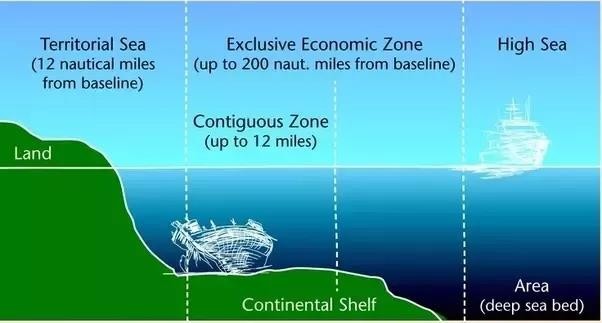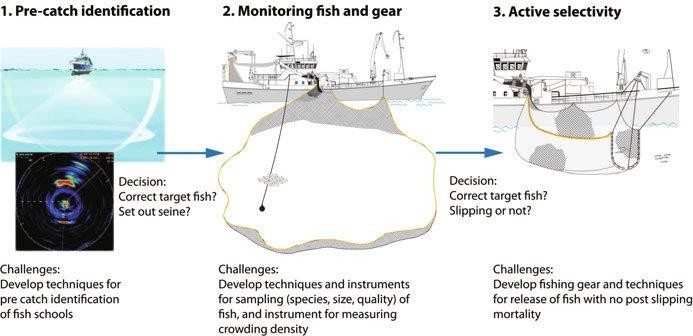24 Feb Purse Seine Fishing
Purse Seine Fishing
Relevance for Mains: What is Purse Seine Fishing, Impact on maritime biodiversity and related environmental issues.
Relevance for Prelims: Territorial waters, UNCLOS, Exclusive Economic Zone.
Why in news
The Exclusive Economic Zone (200 nautical miles) of Tamil Nadu has been authorized for use by fishermen employing purse seine fishing gear to conduct their operations outside of India’s territorial seas, or beyond 12 nautical miles. On the other hand, the Supreme Court has also given purse-seine fishing boats a few limitations.

Purse Seine Fishing
What is Purse Seine Fishing
- In the open ocean, purse seines are used to catch large schools of pelagic (midwater) fish, such as tuna and mackerel, that belong to a single species.
- A vertical net “curtain” is used to confine the school of fish, and the bottom of the curtain is then dragged together, like how drawstring bag ropes are pulled taut.
- Open-water purse-seine fishing is typically regarded as an effective method It has no touch with the seafloor and only minimal bycatch (unintentional capture of undesirable species).

Purse Seine Fishing Technique
Laws and conventions in Purse Seine Fishing
- In accordance with UNCLOS Articles 1(a) and (b)(iii), coastal nations have the sovereign right to control how the living and non-living resources of the EEZ are utilized, managed, and protected from overexploitation.
- To prevent overexploitation, coastal States must establish the total allowable catch (TAC) in the EEZ (Articles 61(1) and (2) of UNCLOS) based on the best scientific evidence available.
- Access to the zone by foreign fleets is also solely at the discretion of the coastal state and subject to its laws and regulations. There are various regional groups that either restrict the deployment of large drift nets or at least demand their abolition, such as the 1989 Tarawa Declaration of the South Pacific Forum.
United Nations Convention on the Law of the Sea
Article 61 – Conservation of the living resources
Article 56 – Rights, jurisdiction, and duties of the coastal State in the exclusive economic zone.
Article 17 – Right of innocent passage Subject to this Convention, ships of all States, whether coastal or landlocked, enjoy the right of innocent passage through the territorial sea.
Article 18 – Meaning of passage
Passage means navigation through the territorial sea for the purpose of (a) traversing that sea without entering internal waters or calling at a roadstead or port facility outside internal waters; or (b) proceeding to or from internal waters or a call at such roadstead or port facility.
Article 19 – Meaning of innocent passage
The passage is innocent so long as it is not prejudicial to the peace, good order, or security of the coastal State.
Issues on Purse Seine Fishing
- This method was connected to worries in certain States about the diminishing stocks of tiny, pelagic shoaling fish on the western shores, including sardines, mackerel, anchovies, and trevally.
- According to the scientific community, the El Nino phenomena and other climatic factors are to blame for the decrease in such fish catches during the past 10 years.
- Nevertheless, fishermen who use more conventional techniques have directly blamed the increase in purse seine fishing and worry that if the restriction is overturned, the abundance of these little fish may further decline.
- They have also requested that the Government reveal the expert committee report on which it based its support for the removal of the prohibition.
- The diminishing supply of oil sardines, a favorite of fish lovers in Kerala, is serious Only 3,297 tonnes of sardines were taken in Kerala in 2021, a significant drop from the 3.9 lakh Tonnes taken in 2012.
- A purse seine is a type of non-targeted fishing gear that can catch any fish that gets in the way of the net, including young fish. As a result, they seriously harm aquatic resources.
What could be done
- In accordance with UNCLOS Articles 56.1(a) and 56.1(b)(iii), coastal nations have the sovereign right to control how the living and non-living resources of the EEZ are exploited, managed, and protected from Foreign fleet entry into the zone is likewise exclusively at the discretion of the coastal state and is governed by its rules and regulations.
- The supreme court should take cues from the duties resulting from the multilateral and regional accords that are intended to implement sustainable fishing methods over a specific length of time, allowing a shared resource like fish to be renewed organically.
- The most reliable scientific evidence must be used to calculate the total permissible catch (TAC) in the EEZ by coastal States to prevent overexploitation (see UNCLOS Articles 61(1) and (2)). The Supreme Court may have consulted the Southern Bluefin Tuna Conservation Convention of 1993 (SBT) for directions to help fishing populations that have been depleted recover.
Source:
PLUTUS IAS CURRENT AFFAIRS 24th FEB 2023
Daily Current Affairs for UPSC
The topic described above is related to the latest news on Purse Seine Fishing. Get such kinds of the best daily current affairs for the UPSC examination free of cost. Also, Get weekly and monthly current affairs for the IAS exam preparation. Through reading this article the aspirants can acquire knowledge of details on laws and conventions on Purse Seine Fishing. The aspirants also get knowledge on the advantages and disadvantages of Purse Seine Fishing.
Read More:




No Comments